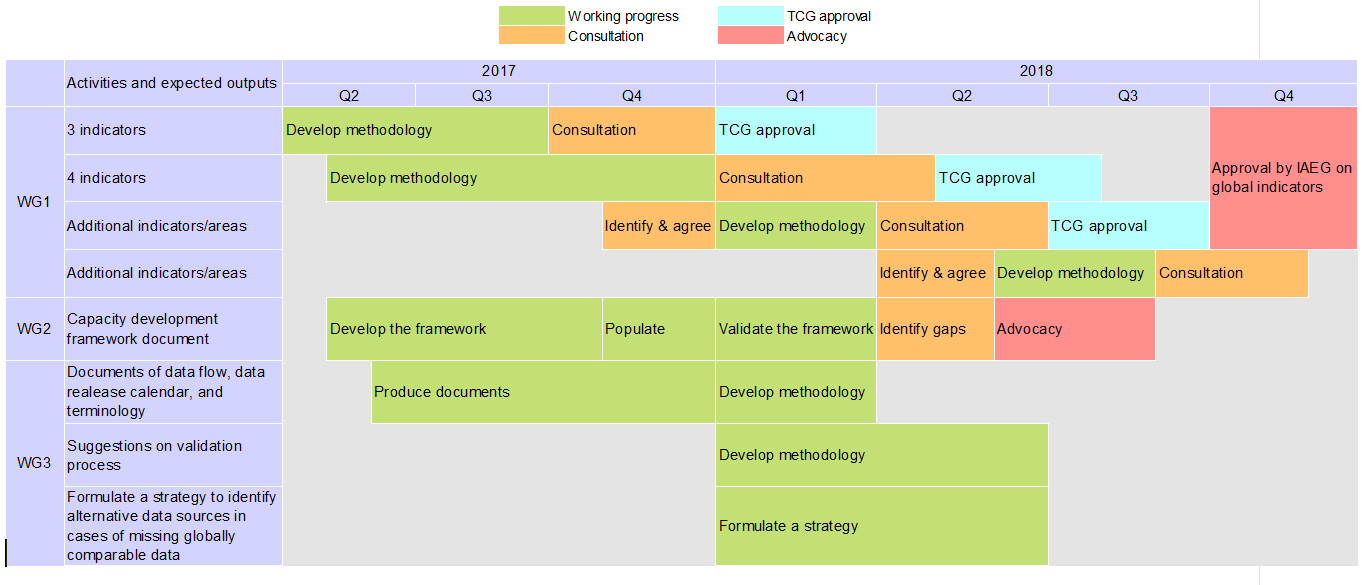Second Meeting of Cross-National Assessments: Linking and Comparability
22 September 2017
In support of GAML, the UIS is inviting the directors of all regional and international learning assessments to resolve the measurement issues needed to improve the coverage and comparability of data needed to produce SDG Indicator 4.1.1. In particular, the UIS is exploring ways to link assessments and ensure the global comparability of the results when reporting progress on SDG.
First Phase of CapED Initiative to Bridge the Gap between Education Policy and Data
2 August 2017
The UIS and the Education Sector have completed the first phase of a pilot project in ten countries to bridge the gap between national education policies and data through the Capacity Development for Education (CapED) Program. As part of the first phase of the initiative, the ten countries have completed a review of national plans and policies in light of SDG 4 commitments while the UIS has released a range of new training materials and tools to improve the collection, quality and use of education data.
Learning Progression Explorer - Tell Us What You Think
26 July 2017
The UNESCO Institute for Statistics (UIS) and the Australian Council for Research (ACER) have launched a global consultation on the Learning Progression Explorer, a prototype presenting the methodological work underway to develop common learning metrics needed to measure progress towards SDG 4.1.
Third Meeting of the SDG-Education 2030 Steering Committee
28 June 2017
Education leaders from around the world come together to discuss ways of taking Sustainable Development Goal 4 to the next level. Among the key participants were Peter Thomson, President of the General Assembly , UN Deputy Secretary-General Amina Mohamed and the Founder of Building Africa's Future Foundation, Saul Mwame. They all argued for higher investment in early childhood, teachers, innovation, lifelong learning along with educating young people to take ownership of the SDGs.
Results of the Third TCG Meeting
12 June 2017
The TCG was updated on the latest developments of the Global Alliance to Monitor Learning (GAML). With GAML leading the development of learning-related indicators, the TCG can focus on the remaining issues related to indicator development, capacity development and country reporting.
Indicator Development
Indicator Development
During its second meeting in October 2016, the TCG identified 22 global and thematic education indicators requiring further methodological development. The TCG's Working Group on Indicator Development is currently working on seven indicators (Table 1). These indicators either have an existing methodology that is already being used by other organizations but that needs refinement to reflect the needs and contexts of a wider range of countries, or because the working group can draw on considerable expertise in particular areas. More details can be read in the Status of the Global and Thematic Indicators for the Follow-up and Review of the Education 2030 Agenda.
<h3 ">Table 1: Indicators already in the process of being developed
Indicators that can draw on considerable expertise from partners |
|
| <p ">4.7.1 | Extent to which global citizenship education and education for sustainable development are mainstreamed at all levels in national education policies, curricula, teacher training and student assessment |
|
4.a.2 |
Percentage of students experiencing bullying, corporal punishment, harassment, violence, sexual discrimination and abuse |
Indicator with established methodologies on considerable expertise from partners |
|
| 4.3.1 | Participation rate of youth and adults in formal and non-formal education and training in the previous 12 months, by sex |
Indicators that can be developed relatively easily |
|
| 4.4.3 | Youth/adult educational attainment rates by age group, economic activity status, levels of education and programme orientation |
| 4.7.2 | Percentage of schools that provide life skills-based HIV and sexuality education |
Indicators requiring extensive further methodological development |
|
| 4.c.5 | Average teacher salary relative to other professions requiring a comparable level of qualification |
| 4.c.7 | Percentage of teachers who received in-service training in the last 12 months by type of training |
Capacity Development
The UIS has developed a range of tools to help countries assess and improve the quality of their data by making the best use of relevant sources and applying international standards and best practices. This work lays the basis for countries to develop their own National Strategy for the Development of Education Statistics. To leverage these tools, the TCG Working Group on Capacity Development will offer countries guidance on existing tools and resources while helping to identify and consolidate any other capacity development issues flagged up by countries and development partners.
Data Reporting, Validation and Dissemination
To show the way forward, the working group will produce a mapping tool to show who collects which data, how data are reported, when the reporting will take place and where the resulting indicators are published. It will also prepare protocols and general guidelines to help countries and organizations find their place within, and manage, these data flows.
The three Working Groups have set up work plans and expected outputs for 2017 and 2018 (Table 2).
Table 2: Timeline of activities and expected outputs of TCG Working Groups, 2017-2018
